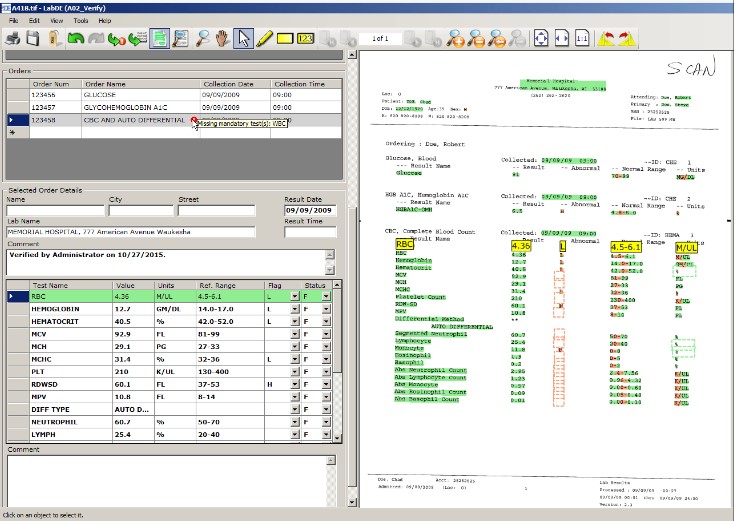Recently, Healthcare Informatics published an article, Considerations for Successful Clinical Data Abstraction.
As the author points out, when moving either from paper charts to EHRs or from legacy EMRs to EHRs, migrating clinically valuable data often involves manual abstraction. Read MoreGreg Gies
Recent Posts
Posted by Greg Gies on Dec 14, 2015 1:34:00 PM
Posted by Greg Gies on Dec 10, 2015 6:42:00 PM
The Centers for Medicare & Medicaid Services regulates laboratory testing performed on humans in the U.S. through the Clinical Laboratory Improvement Amendments (CLIA) to ensure quality laboratory testing. CLIA sets high standards for quality control, validation of data and tests, equipment calibration, proper training and certification of users and clear end result reporting that meets proper lab data requirements.
Complying with CLIA requirements creates a necessary and significant impact on your human resources. When you receive orders on paper or electronically from performing labs outside of your area, you may already have the feeling of being continually challenged with every accredited organization's survey of your records. Your patients routinely generate paper or faxed (electronic) results from your outreach or ambulatory clinics that require human data transcription. You receive a variety of results values from a broad list of performing labs. You may feel that you have experienced and competent staff, but let’s be honest; nobody is a perfect typist.
Read MorePosted by Greg Gies on Dec 7, 2015 2:14:00 PM
Health data challenges are a part of any healthcare organization. Frustration is a natural consequence. This is also a common topic in most healthcare press lately. It often feels like depending on which way the wind is blowing, the consensus is that EMR adoption by clinicians is either improving or getting worse. A recent KLAS report indicates adoption is improving across the globe. The decision to move to an enterprise EMR for most organizations often includes as a factor the goal of reducing the total number of applications supported. Initiatives to improve adoption then becomes a challenge if your department's prized application is removed for something "less than robust". Along with pain and frustration, keeping your clinicians happy is also a  challenge.
challenge.
Posted by Greg Gies on Dec 2, 2015 1:45:12 PM
In my previous post about lab results interoperability, the sixth in a series of seven blog posts that discuss some misperceptions about lab interfaces and intelligent clinical data extraction software, I described a common misperception we encounter in our work with healthcare organizations. We are frequently told that the HIM department already has scanning, indexing and document management software for integrating paper / unstructured documents such as faxed lab results with the EMR.
Read MorePosted by Greg Gies on Nov 18, 2015 5:06:17 PM
A common concern expressed about automated clinical data extraction is “How can we be sure that the data going into the EHR is correct”?
Read MorePosted by Greg Gies on Nov 11, 2015 12:06:00 PM
In my previous post, the fifth in a series of seven blog posts that discuss some misperceptions about lab interfaces and intelligent clinical data extraction software, I addressed the belief that if a hospital has an in-house laboratory that all test results will be integrated with the patient record in the EMR.
Read MorePosted by Greg Gies on Nov 4, 2015 1:19:27 PM
We love it when things match up nicely!
Reconciling lab results with orders is an important patient safety measure that ensures results are received for each test that is ordered. If lab results are sent from your own internal lab, the test data is likely integrated with the EMR and matching the results to every order is automated. The same is true for interfaced reference labs. But what if the results are arriving from non-interfaced sources, such as via paper or electronic faxes from an external reference lab?
Read MorePosted by Greg Gies on Oct 30, 2015 2:44:33 PM
In my previous post, the fourth in a series of seven blog posts that discuss some of the misperceptions about lab interfaces and intelligent clinical data extraction software, I addressed the belief that if a hospital has an in-house laboratory, all test results will be integrated with the patient record in the EMR.
Below is the list of misperceptions this blog series will cover. This post addresses the fourth misperception in bold type in the list below. Read MorePosted by Greg Gies on Oct 26, 2015 5:03:00 PM
In a recent Health Informatics Journal article reporting of “true integration” of electronic laboratory results, it was mentioned that transcription errors remain a bottleneck with comprehensive electronic health records. This shouldn’t come as a surprise to those who encounter paper labs every day in their daily workflow. For most hospitals, a significant number of records are interfaced. But if you are working with paper daily, you might think it debatable that manual data entry is insignificant.
These days, clinical informatics departments are working hard to solve many priority issues. But depending on where your hospital is located geographically, your clinical information challenges have a direct correlation with the patient population your hospital is serving. For example, if your patients travel very long distances to your facility, it is very likely that your clinical services are handling and entering results from paper labs and dealing with costly transcription errors.
Similarly, if you are like most organizations, you
Read MorePosted by Greg Gies on Oct 22, 2015 5:03:00 PM
Last week I published the third in a series of seven blog posts that discuss some of the misperceptions about lab interfaces and intelligent clinical data extraction software.
Below is the list of misperceptions this blog series will cover in the span of seven weeks. This post addresses the misperception in bold type in the list below.
- We are implementing or already have an interface to Quest and/or Labcorp and no longer have to manually enter test results.
- Only a small percentage (typically estimated to be 10 – 30%) of lab results don’t come through the interface so it’s not a high priority problem.
- We have an in-house lab that handles our lab tests.
- All of our test equipment is interfaced with the LIS, which is integrated with our EMR.
- For non-interfaced test results we already have scanning software.
- Optical character recognition (a.k.a. OCR) isn’t accurate enough for clinical data.








